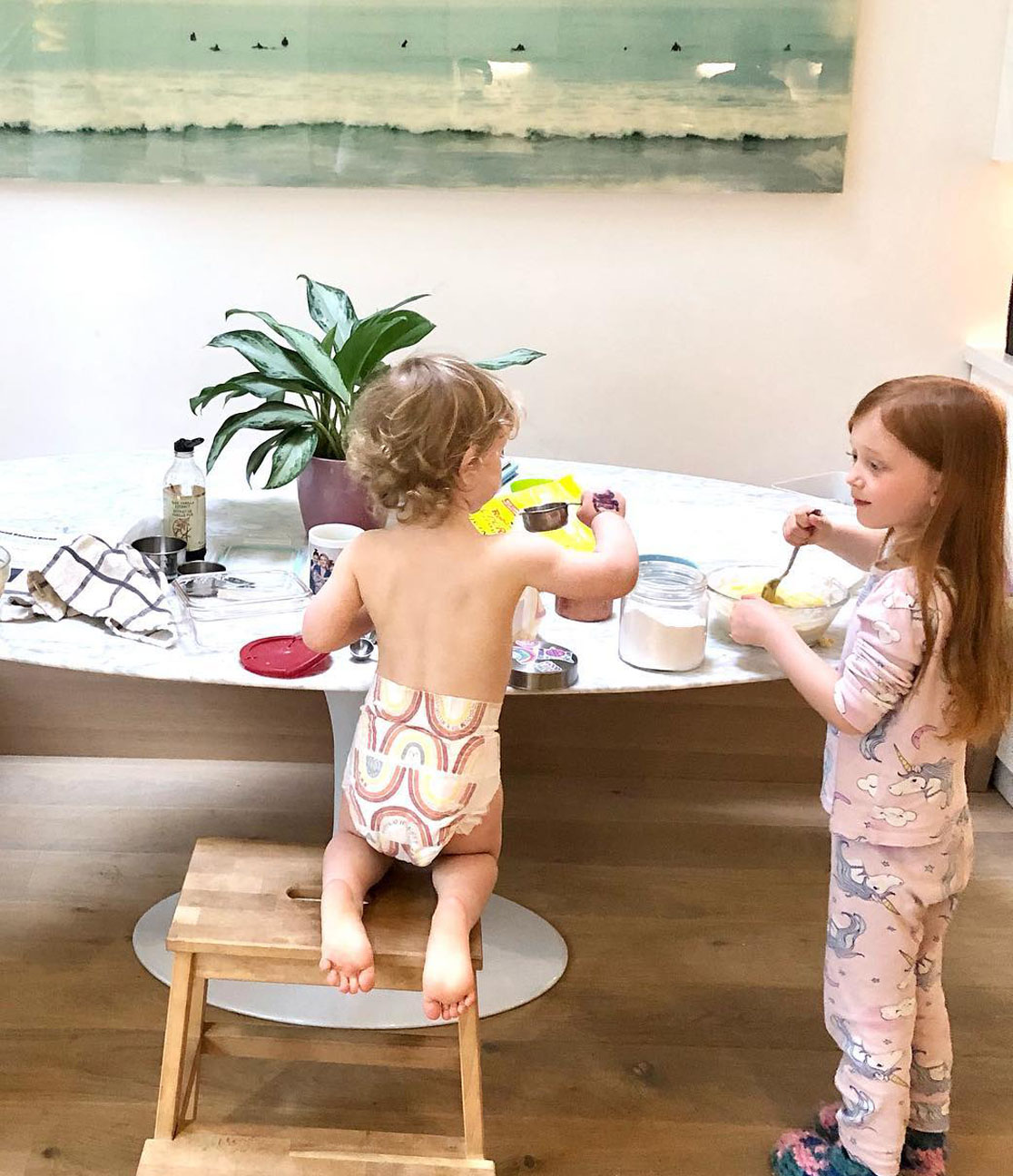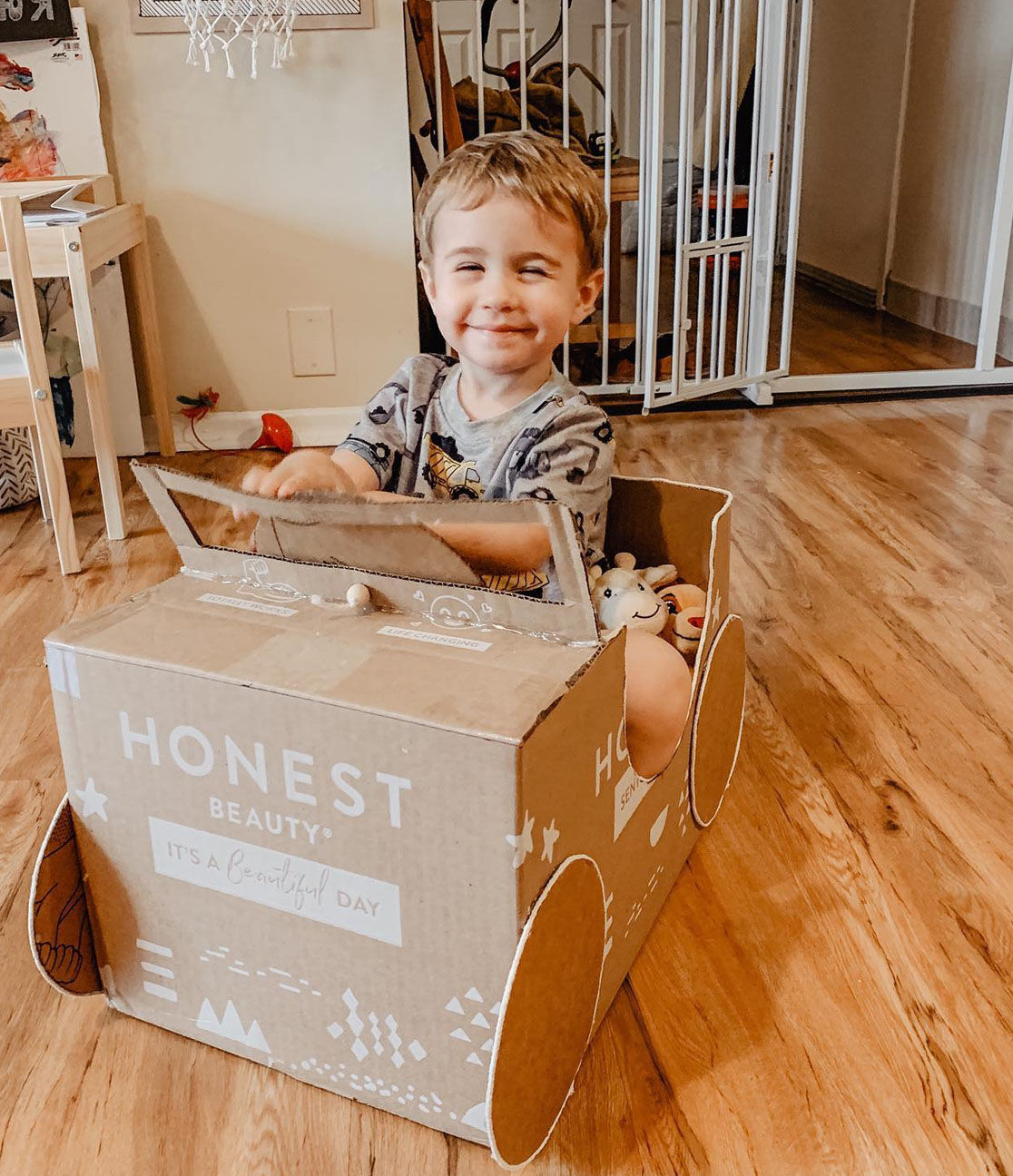Image by @craftymomia
Whether your child has returned to their school for in-person learning or the dining room table has become their classroom, after school activities provide an opportunity to supplement your child’s development, boost their creativity, and keep their brain engaged even after school is over for the day. Maybe you have the school morning routine down, but how about after the bell rings?
It can be difficult to come up with fun after school activities five days a week for an entire school year (as if you didn’t have enough to do as a parent). If you’re having trouble finding inspiration for your child’s after school enrichment, this article is for you.
We’ll explore ten after school activities for kids that engage their artistic spirit, keep them moving, and keep their neurons firing even after the last school bell rings. Plus, they’re all easily adaptable for your child’s age, developmental skills, and physical abilities.
#1 Collage Art
Studies show that engaging in artistic activities can strengthen kids’ fine motor skills, language development, math abilities, and cognitive development. One of the most simple art forms is collage—creating an image or a series of images with numerous existing materials.
You likely have countless sources for collage materials at home already, making it one of many easy after school activities for your kids. Challenge your children to make a work of art out of:
- Food labels from your pantry
- Clippings from magazines, newspapers, or junk mail
- Wrapping paper scraps leftover from the holiday season
- Noodles, rice, and other dry foods that won’t attract pests
With a bottle of glue, a few crayons, and a simple paper backdrop, your little student could become the next world-renowned collage artist. And don’t worry about the mess. That’s what hand sanitizing wipes and a gentle, yet effective laundry detergent is for.
https://www.pexels.com/photo/photo-of-girl-pouring-flour-on-bowl-4149028/
#2 Simple Snack-Making

Image by @essentialchristine
Involving your children in simple after school snack-making is an excellent way to get them excited about their own nutrition, teach them the basics of cooking, and encourage them to get creative with ingredients and flavors. Plus, they’ll get one of their favorite rewards once they’re done—a tasty snack!
Just make sure all surfaces have been wiped down with a proper disinfectant spray and all hands have been properly washed and sprayed with a gentle hand sanitizer before the fun begins.
Teaching your kids to make simple snacks provides them with real-world skills like tool selection, fine and gross motor skills, and waste prevention. Plus, having them help with the clean-up teaches them a valuable lesson in cause and effect—making a delicious meal always creates at least one mess.
Snack-making is also easily scalable for different ages and abilities. After all, every great culinary artist had to start somewhere, so why not start with snack ideas for kids.
#3 Music Appreciation
Even if you don’t have any instruments at home, you can still get your kids engaged in music after school. Involving music in your child’s day-to-day life can strengthen their language abilities and engage numerous senses simultaneously, making music appreciation an enriching, fun after school activity.
Whether you put on music while your child decompresses from the school day or sit them down for a formal, distraction-free listening session, encourage their musical awareness by asking them questions about the music they heard, like:
- How does this song make you feel?
- Does this song remind you of any other songs?
- Which instruments did you hear?
- Did you remember any of the lyrics?
While you should mix in a variety of genres to give your child more well-rounded musical exposure, don’t forget about this excellent opportunity to introduce them to the music of your youth. Go ahead and belt out “Rebel Girl” in the kitchen with your children— they will love it!
#4 Educational YouTube Videos
If you’re a stay-at-home parent, work doesn’t stop when your kids get home from school. Whether you’re prepping dinner, doing laundry, paying the bills, or taking a well-deserved break, putting your kids in front of a screen isn’t always detrimental to their social skills.
Before your kids get home, do a little research. There are numerous educational, kid-friendly YouTube channels offering enriching, fascinating videos for your kids to enjoy while they eat a snack or decompress after a long day at school.
If your child is able, let them choose their own video from a few pre-screened options.
Pro-tip: Making a YouTube playlist with parent-approved educational videos can help keep them from stumbling upon your recently-watched TiktokVine compilations or makeup tutorials.
https://www.pexels.com/photo/a-boy-drawing-on-a-paper-4867384/
#5 Quick Sketches
Like listening to music, art is good for our brains—kid brains included. Making art releases dopamine, a “happy chemical” that stimulates the reward pathway in our brain, further motivating us to keep creating.
If you simply don’t feel like setting up—or cleaning up—an intensive art project, challenge your kids to quickly sketch something in their environment.
The short timeframe of this activity doesn’t just accommodate a short attention span. In figure-drawing classes, instructors often challenge students to sketch the model as quickly as possible, setting a timer for under five minutes. They do this for a few reasons:
- With limited time, students are less likely to hyper fixate on creating a “perfect” drawing.
- A short exercise helps artists “warm up” for upcoming creative challenges.
- It helps artists draw without looking at the paper, improving their proprioception—a fancy word for knowing where your limbs are without looking at them.
All of these can benefit your kids, too. The best part of this activity—a pencil and a piece of paper are all you need to get started.
#6 Luck-of-the-Draw Poetry
Your kids encounter poetry every day while reading rhyming picture books or listening to music. Why not challenge them to create poetry of their own?
But, instead of sitting them down with a pencil and notebook and expecting them to become the next Robert Frost, give them a launching pad for inspiration. Mix up a few slips of paper with random, developmentally-appropriate words in a hat or a bowl, and ask your little student to pick out a few. Challenge them to use the words they chose in their poem.
Keep the words simple to avoid frustration, but don’t be afraid to throw in a few unfamiliar ones to grow their vocabulary.
#7 Nature Photography
If your child is attending class in person, remember that they might only get to be outdoors once or twice during the school day. Giving them some outside time is an excellent way to burn off after-school energy, but there’s plenty of creativity to be found in the great outdoors.
Plan a day outdoors with your children and teach them how to take photos of things they find in nature. It’s is an excellent way to feed their creative spirit. Offer to print and hang one of their creations to complete the experience.
https://www.pexels.com/photo/girl-in-white-and-yellow-floral-dress-playing-with-other-kids-8613169/
#8 Freestyle Dance
Speaking of burning off after school energy, don’t forget to explore opportunities for physical creativity, like dancing. Even if you dance like a middle-aged dad at a barbecue, don’t be afraid to cut loose and groove with your kids.
Freestyle dancing can beis an excellent activity for children for a variety of reasons:
- Without any expectations for matching choreography or honing skills, kids can learn to move comfortably in their own skin, which is a skill in itself.
- They’ll learn rhythmic skills that increase their appreciation for music.
- They’ll develop confidence in and comfort with dancing, a skill that will serve them well in adulthood.
If you’re feeling ambitious, don’t be afraid to teach them a few simple line dances or challenge them to choreograph their own dance.
#9 Letter-Writing
In the digital age, letter-writing is quickly becoming a lost art. But, an easy way to engage your child in real-world activities is to teach them all about the postal system.
While your child will likely learn letter-writing in school, challenge them to write a letter to a relative or a friend. Encourage them to include all of the conventional parts of a letter—the date, a greeting, and a signature. Give them an envelope, a stamp, and walk them out to the mailbox.
While it might sound quaint, letter-writing has numerous benefits for child development, like:
- Harnessing language skills in the real world
- Developing fine motor functions like writing, folding, and licking an envelope
- Learning about various modes of communication
Plus, watching your child’s eyes widen when you tell them that their letter will magically appear in Grandma’s mailbox in two to three business days? Priceless.
#10 Screen-Free Time
Especially if your child is learning virtually, giving them some screen-free time after school is crucial. While technology certainly has its place, they’ll likely be relieved to have an opportunity to exist completely in the real world.
Most of the activities above are screen-free, but other possibilities include:
- A quick session of yoga or stretching
- Reading a book
- Playing with action figures, blocks, or other non-digital toys
- Folding laundry, tidying their bedroom, and other simple chores
If you join your child for a screen break, you might just find the value of purely analog time in your own life.
Honest: Helping You Keep Your Creative Kids Healthy
After school activities don’t have to be expensive, time-consuming, or require lots of supplies—after a full day of organized learning, your kids will appreciate relaxing, keeping it simple, and getting creative throughout the school year.
At Honest, we know that keeping your kids healthy and clean is just as important as nourishing their creative spirits. Our collection of cleaning products makes it even easier to maintain your children’s most important creative space—their home.
Whether you’re looking for cleaning solutions that meet your needs, self-care supplies for you, or products for your baby, Honest has everything you need to give yourself—and your kids—the best care possible.
Sources:
Rymanowicz, K. (2015, January 22). The Art of Creating: Why Art Is Important for Early Childhood Development. Michigan State University. https://www.canr.msu.edu/news/the_art_of_creating_why_art_is_important_for_early_childhood_development
Brown, L. (2012, May 7). The Benefits of Music Education. PBS for Parents. https://www.pbs.org/parents/thrive/the-benefits-of-music-education
Gharib, M. (2020, January 11). Feeling Artsy? Here’s How Making Art Helps Your Brain. NPR. https://www.npr.org/sections/health-shots/2020/01/11/795010044/feeling-artsy-heres-how-making-art-helps-your-brain
We aim to provide you with the most honest and credible information possible. This article was reviewed for accuracy by The Honest Team and was written based on sources that are linked at the bottom of the article.
blog_review_statement





